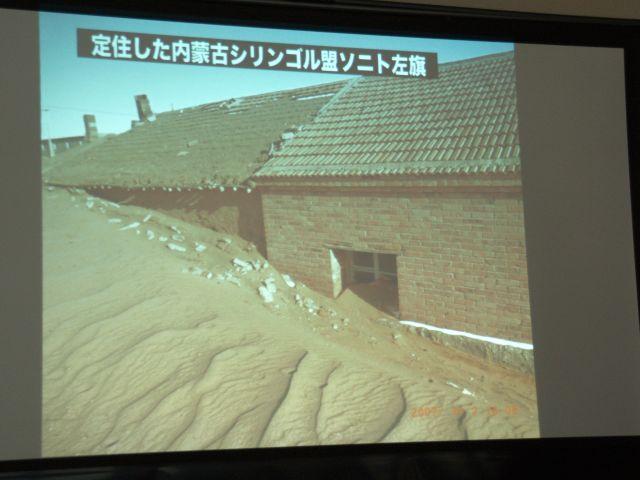 |
|
|
Dr.Hoshino Buho,
Professor of
Environmental Science at
Rakuno Gekuen
University, Japan
|
|
 |
|
|
Sedentarization of Sunid
Left Banner of
Shiliin-gol League,
Southern Mongolia
|
Three Thousand Year Old Mongolian Nomadic Way of Life Wiped Out by the Chinese Authorities within a mere Decade: The Epoch Times Conference (1):
[The Epoch Times, April 12] Sandstorm. It is even given a beautiful name “Spring Glow”. On April 11, at a conference held in Hokkaido, Japan, Dr. Hoshino Buho, Professor of Environmental Science at Rakuno Gakuen University, presented the results of his fieldwork and satellite images that illustrated the possible spread of toxic pollutants during the past decade by sand storms. Audiences were shocked by the speed of environmental destruction taking place in the neighboring country, its impact on Japan, and the fact that the three thousand year old Mongolian nomadic way of life has been destroyed by the misguided policies of Chinese authorities within the span of a single decade.
“Year 2009 Looking Through China: The Truth of CCP Policies of Environmental Destruction and Persecution of the Citizenry” hosted by the Epoch Times invited Dr. Takamine Ichi, in addition to Professor Hoshino, who testified to the Chinese authorities’ decade long continuing persecution of Falungong practitioners, to inform the people of how the peaceful practice of Qigong has been unjustly repressed.
Professor Hoshino is an ethnic Mongolian and Dr. Takamine is an ethnic Korean, both were born in China and objectively presented discussions on problems China is facing from the perspective of frontier nationalities. This is the report of Professor Hoshino’s speech.
Remote Sensing and Field Work
Not only using remote sensing technology with images and data obtained by satellites and airplanes to analyze the surface of the earth, but also having conducted fieldwork across a range of 2,500 km in his home country of Southern (Inner) Mongolia, Professor Hoshino presented his findings with astonishing persuasiveness.
Desertification is a Man Made Tragedy
According to Professor Hoshino, Southern Mongolia had continuous natural, beautiful and rich grasslands until a decade ago when research revealed the intensifying desertification. Professor Hoshino referred to this as a man made tragedy due to the Chinese authorities’ policy failures rather any natural disaster.
Originating from the Gobi desert, sand storms, known as “sha chen bao” in Chinese, damages everything from people’s homes to automobile.
Lifted up into the sky by massive energy forces, yellow dust had earlier fallen in Western Japan, but due to the northerly movement of desertification, today yellow dust falls on Hokkaido, Tohoku and Kanto regions in Japan.
In addition, factories on the east coast of China continue to move to the western frontier to create further air pollution and produce more toxic wastes.
It is the Chinese authorities’ policy that sped up and exacerbated the desertification of Southern Mongolia. In order to enforce sedentarization and high productivity, the authorities set up fences and enclosures to aggressively control pastoralism. Due to the fencing, livestock including goats were confined and could only graze on the same pastures, which reduced the chances of recovering the vegetation.
Furthermore, due to the economic demands for high productivity, the livestock population increased sharply, which in turn brought about overgrazing and its consequences.
At the same time, the agricultural practices of farming settlers further exacerbated desertification. As thin as a few centimeters, the top soil of Southern Mongolian grassland exposes its sandy layer easily once turned up.
Ignoring the fact that elderly Mongolians warned “not to cultivate grasslands” for generations, the Chinese authorities imposed the policy of sedentarization on the Mongolians whose mixed feelings reflected their involuntary loss of their pastoral way of life, knowing that they had no choice but to engage in agriculture.
It is clear that the nomadic way of life that had kept the balance of Mongolian natural environment for more than three thousands years has been destroyed by the Chinese authorities in the span of a single decade.







